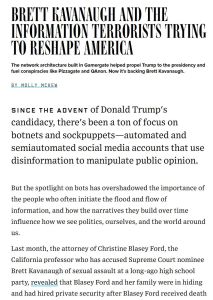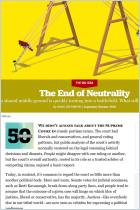Join getAbstract to access the summary!

Join getAbstract to access the summary!
Molly McKew
Brett Kavanaugh and the Information Terrorists Trying to Reshape America
Wired, 2018
What's inside?
A cadre of well-organized human instigators have ushered in a new disinformation age.
Recommendation
Discussion about fake news and the spread of disinformation is often very technology-centric, with the human element receiving short shrift. As Molly McKew argues in Wired, however, the powerful impact of right-wing conspiracy theories on American politics in recent years is not due to bots and trolls alone. Her compelling essay explains how seemingly outlandish conspiracy theories manage to gain traction among millions of Americans, and how a group of well-organized fringe activists has succeeded in captivating the political discourse.
Summary
About the Author
Molly McKew is a foreign policy and strategy consultant, and an expert on information warfare.


















Comment on this summary